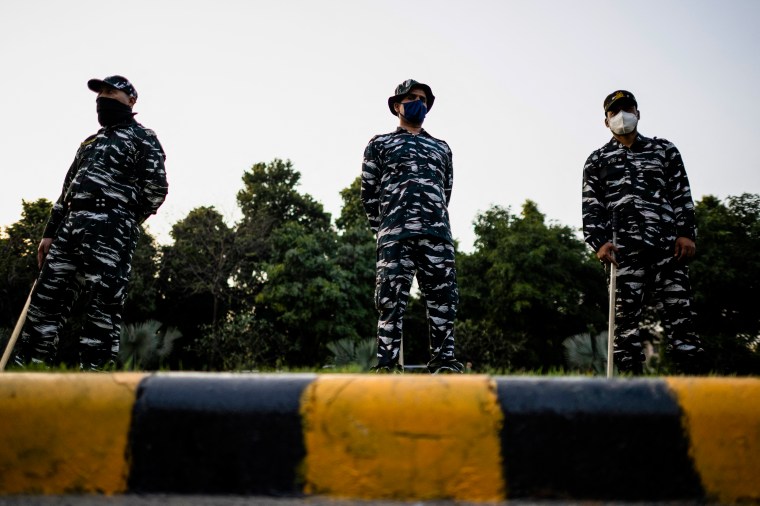New Delhi, April 7, 2022 – Indian authorities should release journalists Ajit Ojha and Digvijay Singh immediately, drop their investigation into journalist Meer Faisal, and ensure that members of the press can work freely and safely, the Committee to Protect Journalists said Thursday.
On March 30, police in Uttar Pradesh’s Ballia district arrested Ojha and Singh, journalists with the privately owned Hindi daily Amar Ujala, in relation to their reporting on leaks surrounding a state school exam, according to multiple news reports.
Separately, on April 3, attendees of a demonstration in Delhi organized by right-wing Hindu groups attacked at least five journalists covering the event, and police opened an investigation into Faisal over his commentary on that attack, various news reports said.
“Police harassment of journalists in Delhi and Ballia mark a worrisome trend of attacks on the free press that need to come to a halt immediately,” said Steven Butler, CPJ’s Asia program coordinator, in Washington, D.C. “Indian authorities must release Ajit Ojha and Digvijay Singh immediately, drop their investigation into Meer Faisal, and hold to account those responsible for attacking journalists in Delhi.”
Police have arrested more than 30 people, including the students’ parents and Singh and Ojha, over the leaks of two school exams in Uttar Pradesh, according to those news reports. Singh was quoted in the Indian Express saying that police had repeatedly asked about the sources for his reporting on the leaks, and Ojha was quoted in The Wire saying that police vandalized his office and manhandled his colleagues while arresting him.
Those reports also stated that Manoj Gupta, a journalist with the Rashtriya Sahara newspaper, had been arrested, but CPJ was unable to immediately determine whether he also covered the leaked exams.
Police are investigating both journalists under Section 66B of the Information Technology Act, pertaining to receiving stolen digital resources, Section 420 of Indian Penal Code, which covers “cheating and dishonesty,” as well as two sections of the Uttar Pradesh Public Examination Act, pertaining to disclosing school exams, according to The Wire.
Convictions under the IT act can carry prison terms of up to three years and fines of up to 100,000 rupees (about US$1,317); convictions under Section 420 of the penal code can carry prison terms of up to seven years and a fine; the Uttar Pradesh exam law can carry penalties of up to five years in prison and a fine of up to 500,000 rupees (US$6,580).
In Delhi, attendees of the April 3 event attacked Faisal, reporters Shivangi Saxena and Ronak Bhat of the news website Newslaundry, freelance photojournalist Md Meharban, and Arbab Ali of the news portal Article 14, and shouted insults at Meghnad Bose of The Quint and another journalist whose name was not disclosed, according to multiple news reports.
Saxena and Bhat wrote that demonstrators hit Bhat, threw his glasses to the ground, tried to steal his equipment, and “one tried to pull his backpack, another his arms and legs.” When Saxena tried to film the assault, “one grabbed her bag, another held her shoulder, a third held her hand in which she had her phone” they wrote. Neither journalist wrote that they sustained any serious injuries.
Ali told Newslaundry that the mob hit him and Faisal in front of the police, and that demonstrators said “don’t give these two to the policemen, just kill them. These are jihadis, they are mullahs.”
Following that attack, police in Delhi opened an investigation into those suspected of assaulting the journalists, and also started an investigation into Faisal, a journalist with Article 14 and the news website Hindustan Gazette, according to those reports and a statement by the police.
Police accuse Faisal of inciting hatred between classes in a tweet he published after the attack, saying the journalists were “beaten up because of our muslim identity by Hindu mob.” Police are also investigating Article 14 for the same offense after it also tweeted about the incident.
If convicted of making statements to create or promote enmity, hatred, or ill-will between classes under Section 505(2) of the Indian penal code, Faisal and the publisher of Article 14 could face up to three years in prison.
CPJ emailed Uttar Pradesh Police Director-General Mukul Goel and Delhi Police Commissioner Rakesh Asthana for comment, but did not receive any replies.
